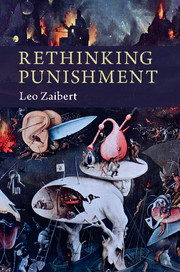Crossref Citations
This Book has been
cited by the following publications. This list is generated based on data provided by Crossref.
2018.
BOOKS RECEIVED.
The Cambridge Law Journal,
Vol. 77,
Issue. 3,
p.
662.
Yankah, Ekow N.
2020.
Punishing Them All: How Criminal Justice Should Account for Mass Incarceration.
Res Philosophica,
Vol. 97,
Issue. 2,
p.
185.
Zaibert, Leo
2020.
Explorations in Ethics.
p.
197.
Zaibert, Leo
2021.
Figuring Things Out, Morally Speaking.
Philosophy,
Vol. 96,
Issue. 4,
p.
553.
Zaibert, Leo
2022.
Conflict and Resolution: The Ethics of Forgiveness, Revenge, and Punishment.
p.
101.
Campbell, Tim
2022.
Axiological Retributivism and the Desert Neutrality Paradox.
Philosophies,
Vol. 7,
Issue. 4,
p.
80.
Hoskins, Zachary
2022.
Public Reason and the Justification of Punishment.
Criminal Justice Ethics,
Vol. 41,
Issue. 2,
p.
121.
Lee, Ambrose Y. K.
2022.
Encyclopedia of the Philosophy of Law and Social Philosophy.
p.
1.
Beedon, David Kirk
2022.
Pastoral Care for the Incarcerated.
p.
199.
Caruso, Gregg D.
2023.
The Palgrave Handbook on the Philosophy of Punishment.
p.
489.
Zaibert, Leo
2023.
The Non-Political Foundations of the Problem of Dirty Hands.
The Journal of Ethics,
Vol. 27,
Issue. 4,
p.
477.
Altman, Matthew C.
2023.
The Palgrave Handbook on the Philosophy of Punishment.
p.
195.
Dahan Katz, Leora
2023.
The Palgrave Handbook on the Philosophy of Punishment.
p.
101.
Zaibert, Leo
2023.
The Palgrave Handbook on the Philosophy of Punishment.
p.
221.
Lee, Ambrose Y. K.
2023.
Encyclopedia of the Philosophy of Law and Social Philosophy.
p.
1665.
Kinghorn, Kevin
2023.
God’s Moral Perfection as His Beneficent Love. Comment on Craig (2023). Is God’s Moral Perfection Reducible to His Love? Religions 14: 140.
Religions,
Vol. 14,
Issue. 9,
p.
1205.
Adu-Poku, Akosua Adutwumwaa
2024.
Functionings and the Pains of Parental Imprisonment.
International Criminology,
Vol. 4,
Issue. 2,
p.
166.
Liebling, Alison
2024.
Prison Officers.
p.
27.
Millie, Andrew
2024.
Religion Matters: Volume 2.
p.
113.
de Wijze, Stephen
2024.
Are ‘Dirty Hands’ Possible?.
The Journal of Ethics,
Vol. 28,
Issue. 1,
p.
187.





